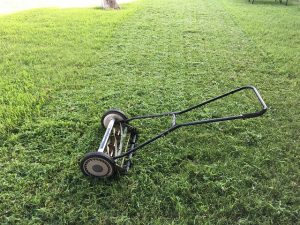Caring for the environment is a common concern these days. Whether you’re a completely off-the-grid fruitarian or just a regular Aussie homeowner, you want to make sure that your gardening practises aren’t harming the planet.
If you have a lawn or are growing a lawn and want to maintain enviro-conscious lawn care, you’ve come to the right place. Here are some of the easiest and best eco-friendly lawn solutions for you to adopt.
Select the right lawn variety
Having the most eco-friendly lawn possible starts at the very basics. You need to select the right lawn for your region. The first step is choosing a lawn variety that will grow well in your yard considering the climate, the soil type, and the amount of sunlight. A lawn variety that isn’t suited to your area will take a lot of fertiliser, pest control, and water to maintain.
Ditch the fuel-powered mower
Fuel-powered mowers are still the most common ones out there, but they’re also the worst for the environment. Electric mowers or mowers with a cord that plug into a regular power socket are a more eco-friendly solution. Believe it or not, push mowers are once again a plausible option! The push mowers on the market today are actually far easier to use than the old ones. They have the added benefit of cutting your grass smoother, causing less blade damage, as well as being silent and therefore neighbour-friendly.
Similarly, use a manual aerator instead of a fuel-powered one. These manual options are far cheaper than their fuel-powered counterparts too – eco-friendly and bank-balance friendly!
Catch your lawn clippings
Lawn clippings are full of natural goodness – throwing them away is a crime against nature! In the summer months you can just remove the catcher all together and let the clippings lay where they fall. Not only do they act like a mulch and keep the moisture in, they biodegrade into a delicious natural fertiliser for your lawn.
In winter months when you need to keep your lawn free of clippings so that it can receive all possible rays of sun, catch the clippings and turn them into compost instead of throwing them in the garden waste bin. They’re chock full of good stuff that will improve your compost.
Water wisely
When you water your lawn, water deeply and slowly. This allows water to be properly soaked deep into the soil without much run off. To avoid wasting water to evaporation, water your lawn early in the morning or late at night (just keep in mind that early in the morning is better for avoiding potential fungal problems).
Every enviro-conscious household should be collecting rainwater to water their garden with. The less you can rely on mains to water your lawn, the kinder you are to the environment.
Use natural fertilisers, herbicides, and pesticides
Applied incorrectly or used inappropriately, chemicals used for lawn care can be harmful to the environment. If you’re aiming for a truly organic lawn, opt for natural, chemical free solutions.
It’s easy to make up natural, home-made herbicides, or you can easily find pre-made ones in any decent garden supplies store. Corn meal gluten is effective as a natural pre-emergent herbicide that will stop weeds before they even sprout, and it has the added bonus of adding nitrogen to your soil.
Vinegar and citric acid combined make a great weed killer, but make sure to only use it as a spot treatment – it can burn through your lawn and other plants too. Similarly, boiling water can even be an effective weed killer too in areas where hand pulling isn’t feasible, like between pavers. Natural soap solutions are a double-barrelled herbicide and pesticide, killing weeds and getting rid of ants too.
Before you apply any fertiliser, test your soil first. You can easily buy cheap soil testing kits online and by running these tests you can add only the absolutely necessary fertilisers to your soil, avoiding adding unnecessary chemicals to the ground.
Clover can act as a living fertiliser, fixing nitrogen for the other grass seeds around it. Blending clover into your lawn seed can reduce the need for chemical fertiliser. If you really need to fertilise with a chemical fertiliser, opt for a time release one with water insoluble nitrogen. Fast-acting fertilisers end up in rainwater run-off.


